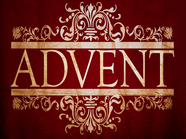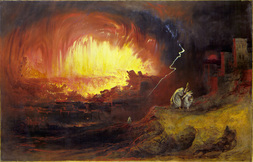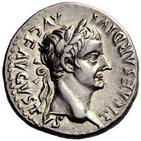

So, when people wish me “Merry Christmas” this year before Christmas Eve, I am going to make a concerted effort to reply “Thoughtful Advent” – they’ll probably think me a pretentious idiot but hey ho…
 Sunday marked the start of Advent and the beginning of a new year in the Church. The Season of Advent is a penitential season, a time for introspection and preparation for the coming of Jesus at Christmas. The word comes from the Latin term Adventus – which means “coming”. This is a translation of the Greek word Parousia – commonly referred to as the second coming of Christ. So it is that Advent is looking forward to celebrating Christ’s first coming, but also anticipates the second coming of Jesus and the subsequent judgement that will follow.  This focus on the Eschaton (see the previous WotW) means that Advent is a time of the year when Christians focus on reforming themselves. Even the colours used in Church reflect this attitude as the vestments and altar cloths turn to purple and blue which are traditionally penitential and hopeful colours. Traditions that Christians in the West have tended to follow at this time of the year include lighting a candle on an Advent wreath each successive Sunday to represent a different aspect of Christian history that preceded Jesus: The Patriarchs, Prophets, St John the Baptist and The Angel Gabriel’s annunciation are remembered on successive Sundays. If the wreath, as in the image here, features a fifth candle this is known as the Christ Candle and is lit on Christmas Eve. I don’t want to get on a soap-box about this (but I'm going to!), but I think it is quite clear that in modern society we have lost sight of this season and have certainly lost the value of it. So many people say that by the time Boxing Day arrives they are fed up with Christmas, having had it rammed down their throat for the past month or probably more. This should not be the case and was not the case in the past; Christmas really begins on the 24th December and then lasts 40 days – how many of us in early February are still thinking about the Christmas message? Not many. We have, probably due to the commercialisation of Christmas and our instant gratification society, got it all the wrong way round (you only have to think about the scenes on Black Friday). We don't want to wait for it and we are too focused on the material side of Christmas. What's wrong with a bit of anticipation and delayed gratification?
So, when people wish me “Merry Christmas” this year before Christmas Eve, I am going to make a concerted effort to reply “Thoughtful Advent” – they’ll probably think me a pretentious idiot but hey ho…  The BBC A History of Ideas series began a little over two weeks ago on Radio 4 and is both a fantastic listen and great learning resource for students of Philosophy. The format goes like this; the week begins with a group discussion led by Melvyn Bragg with four thinkers who then over the course of the week examine the subject in more depth. This range of lawyers, philosophers, neuroscientists and theologians use their own specialism to examine a key Philosopher’s thinking on the issue. So far the topics have been “What is Happiness?” and “What is Beauty?” and have examined the thinking of philosophers such as Hume, Aristotle, Mill, and Hobbs as well ideologies such as Darwinism and Determinism. Each episode only lasts about 10 minutes and so is a great way into the subject, or a fantastic bite-size revision of something you have studied in class. You can download them as podcasts or you can find them all on the BBC website (http://www.bbc.co.uk/programmes/b04bwydw/episodes/guide). In addition there are also animations voiced by Gillian Anderson and The Simpsons' Harry Shearer. These can also be found on the Open University’s website (http://www.open.edu/openlearn/whats-on/radio/ou-on-the-bbc-history-ideas) This week’s title is “How can I tell right from wrong” and contains a great example of Kantian thinking that students study in the L6th; Kant’s Axe Problem: I hope this has wetted your appetite for what is set to be a great series – I will certainly be posting more of them over the coming months here on Fordthought.
 This term is part of a series of “word of the week” posts that focus on fallacies; logical errors in an argument. A false dichotomy is when someone makes a case and presents two opposing views, options or outcomes in such a way that they seem to be the only possibilities. If one is true, the other must be false or, if you do not accept the one then the other must be accepted. The reality in most cases is that there are many in-between and alternative options not just two mutually exclusive ones. One famous example of this was George W Bush when he declared in September 2001 that “either you are with us, or you are with the terrorists":  To many this would be seen as an oversimplification of the situation; you could after all be an absolute pacifist who is not willing to take up arms against any one on ethical grounds and so you are with neither and against neither. You might be in favour of diplomatic negation with terrorists etc. The false dichotomy remains a popular fallacy to utilise because it sounds dramatic and presents listeners with a stark choice (especially if accompanied with a reduction ad absurdum) that will only really offer one way forward. As philosophers and ethicists we need to be alert to its usage! One area that I have seen it used a lot recently is when debating the difficult issue of Euthanasia with my GCSE group. I have found false dichotomies being used by both the pro-choice and pro-life sides of the argument: “You either have Euthanasia, which allows people to die pain-free and with dignity, or you have no Euthanasia and everyone suffers intolerably and with a total loss of dignity” (Pro-Choice) Both of these arguments are flawed in that they offer a false dichotomy – the first ignores the fantastic work that palliative care can do, the second overstates (performs a reductio) what might happen if Euthanasia was legalised.
So, See if you can spot a false dichotomy this week! Are the Ten Commandments the most important set of rules in History? There are of course other serious contenders; the UN Declaration on Human Rights, the five pillars of Islam, the Noble Eight Fold Path of Buddhism or Jesus’ Golden Rule to name but a few. But given the historical and cultural importance of the 10 Commandments it is hard to see a true rival. So why are they so special? They represent a summary of the Law of God, traditionally believed to have been given to Moses directly on Mt. Sinai. The Pentateuch (the first five books of the bible) of course contains a huge number of Mizvot (laws) for people to obey; 603 commandments. But the Ten are special: They concern matters that are fundamental to theological certainty and an ordered society. They are not a detailed as other rules in the Torah as they do not specify the punishment to given for breaking them and seem to be intended as universally applicable, regardless of time, place or situation; in this way they are absolutist (http://awgford.weebly.com/blog/category/absolutism). Their centrality is affirmed by that fact that in Exodus 31:18 they are said to have been “written with the finger of God” onto stone tablets that Moses then took to the Jewish people.  Sodom and Gomorrah: Evidence of God's Hypocrisy? Sodom and Gomorrah: Evidence of God's Hypocrisy? There are a number of things we could discuss about the 10 C’s: Their (re)interpretation by Jesus in the Sermon on the Mount, if they apply to all people or just the Jews who received them first or their historical role in forming the laws that most developed nations follow today. But I just want to say a few words about their absolutist nature and especially of the commandment “Thou shalt not kill”. I often find that students, especially lower down at school will quote the Ten Commandments at you as an argument against any form of killing, they will also say that God must be a hypocrite for killing all those people in the Flood or in Sodom and Gomorrah and that he is breaking his own commandments. I would argue this is to misinterpret the imperative of this law. The commandment is instead an imperative against unlawful killing that would result in bloodguilt – the killing of the innocent and defenceless. In reality there are many cases of justified killing sanctioned in the Torah. In the very next chapter of Exodus, straight after the Ten Commandments are given, it states “Anyone who strikes a person with a fatal blow is to be put to death” (Ex. 21: 12). It is therefore very clear that the commandment cannot be seen as an absolute. There are numerous other justified killing scenarios set out including killing in warfare, in response to crime and when an intruder enters your home. If it is so obvious that the commandment “Thou Shalt not Kill” is not an absolute why do so many people believe that it is? Perhaps it is easier to explain it in these terms to our children when they are growing up? Perhaps people want the answers to be simple and straight forward and this is why absolutism appeals?  This term literally means Witness but has commonly become associated with those who have died for their beliefs. In this week of remembrance it seems appropriate to have this word of the week as we remember those who have gave their lives to uphold the values that they held sacred to them. In the case of WW1 and WW2 it was to protect and uphold our nations’ values in the face of expansionism and fascism.  The term is probably associated most with those early Christians who died at the hands of the Romans. This is currently being studied by our year 9 students; what has been interesting to observe is their reaction when they find out that the persecution of Christians was not empire wide or systematic for much of the first three centuries; rather it was sporadic and due to local disputes - and not very many were "thrown to the Lions"! Often Christians seem to have been scapegoated for problems faced by small communities. This was certainly the case when Pliny the Younger investigated accusations against Christians in Bithynia; he found that Christians did not seem like political dissidents and that their crimes were being exaggerated. This is perhaps not surprising given that the gospels contain commands from Jesus such as “give unto Caesar what belongs to Caesar”. However the early Christians did often cause unrest amongst the Roman elite, mainly due to the fact that they refused to worship the emperor; Politics and Religion were irreconcilably intertwined in the Roman Empire and to refuse to worship the emperor was tantamount to treason. The Romans were in fact very tolerant of other religions and wanted to unite them with their own beliefs, as long as they agreed to pay homage to the Emperor. The one exception to this was the Jews, but they had great antiquity that the Romans admired; however the Christians did not have this quality to let them off the hook. The first emperor we know persecuted Christians was Nero in 64AD, as recorded by Tacitus. However it was not until the third century that Decius and later Diocletian made persecution of Christians enforceable by imperial edict. The effect of these persecutions was not what was desired; rather the Romans were often impressed by the dignity of those suffering and the way that they “died well”. As Tertullian wrote, a Christian convert who himself came to faith having been impressed by martyrs’ bravery, “The blood of the martyrs is the seed of the church”. Then, as now, the death of people standing up for what they believed in was inspirational to those who remained behind. Likewise it seems to pertinent to think that on Tuesday this week people across our land will, in a similar way, stop to remember the witness of those who died for our nation.
 An analogy is a similarity between things. In an argument from analogy, one argues from known similarities to further similarities. Such arguments often occur in philosophy and during an A-level course students will examine a number of them. One of the most interesting (mainly for its weaknesses) is the Analogy of the Watch by William Paley (published in 1802 in Natural Theology) which students study as part of the Teleological argument. I am not going to rehearse the analogy here but it is interesting to note that it was not the first such analogy and that Hume had already heavily criticised its use! In 1776 David Hume published his Dialogues Concerning Natural Religion (you can read the original text here). In it he considers an argument from analogy that purports to show that the universe was created by an intelligent being. The character Cleanthes claims that the world as a whole is similar to things like clocks. A clock has a variety of interrelated parts that function together in ways that serve ends (telos). The world is also a complex of interrelated parts that function in ways that serve ends, such as providing food for human consumption. Clocks are the result of intelligent design, so, Cleanthes concludes, probably the world as a whole is also the product of intelligent design. Hume’s character Philo (who probably mirrors Hume's on thought on the argument) criticises Cleanthes. The arguments he puts forward include:
These criticisms share in common that analogies always break down eventually and are by their nature never airtight. It is possible for things to be very similar in some respects, but quite different in others. A world and a watch do share some characteristics but ultimately not enough for the argument to be very successful in this form. The big question is why did Paley persist in proposing the Watch Analogy in 1802 when Hume had already done a good job of showing the weaknesses of it in 1774? Had he not read Hume? Did he still think the analogy was a good one? If you know the answer - let me know! Can you think of any successful analogies in Philosophy? Do others, such as the Analogy of the Cave (Plato) or Analogical Language (Aquinas) work? |
Archives
June 2016
Categories
All
|
